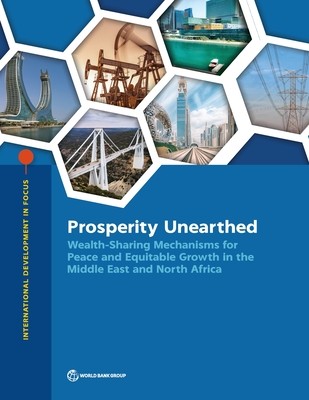
- We will send in 10–14 business days.
- Author: World Bank
- Publisher: World Bank Publications
- ISBN-10: 1464822182
- ISBN-13: 9781464822186
- Format: 21.6 x 27.9 x 0.6 cm, mīksti vāki
- Language: English
- SAVE -10% with code: EXTRA
Reviews
Description
The Middle East and North Africa (MENA) region, rich in hydrocarbons, has experienced both prosperity and challenges due to its vast oil and gas reserves. The region holds more than half of the world's oil reserves and 40 percent of its gas reserves. While these resources have propelled some countries to high-income status and supported regional economic growth through jobs, remittances, and investments, they have also been associated with economic instability and overreliance on a narrow range of commodity exports, as well as resource contests and conflict. "Prosperity Unearthed: Wealth-Sharing Mechanisms for Peace and Equitable Growth in the Middle East and North Africa" delves into the varying development outcomes and wealth-sharing practices in the MENA region and proposes strategies for fostering inclusive prosperity and peace. The book examines wealth sharing through three lenses: time, space, and fragility and conflict. It assesses how policymakers have managed resource distribution over time (saving versus spending) and across geographical areas (concentrating versus distributing). The findings highlight that deviations from best practices in these dimensions have contributed to the region's unmet development potential, particularly in fragile and conflict-affected areas. Key recommendations include decoupling fiscal spending from volatile hydrocarbon revenues to ensure macroeconomic stability and long-term sustainability, implementing transparent and accountable governance mechanisms, and adopting rules-based policies for equitable resource distribution. The book emphasizes the importance of inclusive economic policies, robust transparency arrangements, and strong institutions in achieving sustainable development. By leveraging hydrocarbon resources effectively, MENA countries can build sustainable, inclusive prosperity. The book underscores the need for strong fiscal management, regional cooperation, transparent governance, and inclusive growth strategies to transform resource wealth into improved physical infrastructure, human capital, and economic institutions. These efforts are crucial for fostering peace, stability, and equitable growth in the region. This book was prepared by a multidisciplinary team from the Prosperity Department of the World Bank's Middle East and North Africa Region. Its findings will be of particular interest to policymakers, as well as researchers and development practitioners.
EXTRA 10 % discount with code: EXTRA
The promotion ends in 22d.03:56:24
The discount code is valid when purchasing from 10 €. Discounts do not stack.
- Author: World Bank
- Publisher: World Bank Publications
- ISBN-10: 1464822182
- ISBN-13: 9781464822186
- Format: 21.6 x 27.9 x 0.6 cm, mīksti vāki
- Language: English English
The Middle East and North Africa (MENA) region, rich in hydrocarbons, has experienced both prosperity and challenges due to its vast oil and gas reserves. The region holds more than half of the world's oil reserves and 40 percent of its gas reserves. While these resources have propelled some countries to high-income status and supported regional economic growth through jobs, remittances, and investments, they have also been associated with economic instability and overreliance on a narrow range of commodity exports, as well as resource contests and conflict. "Prosperity Unearthed: Wealth-Sharing Mechanisms for Peace and Equitable Growth in the Middle East and North Africa" delves into the varying development outcomes and wealth-sharing practices in the MENA region and proposes strategies for fostering inclusive prosperity and peace. The book examines wealth sharing through three lenses: time, space, and fragility and conflict. It assesses how policymakers have managed resource distribution over time (saving versus spending) and across geographical areas (concentrating versus distributing). The findings highlight that deviations from best practices in these dimensions have contributed to the region's unmet development potential, particularly in fragile and conflict-affected areas. Key recommendations include decoupling fiscal spending from volatile hydrocarbon revenues to ensure macroeconomic stability and long-term sustainability, implementing transparent and accountable governance mechanisms, and adopting rules-based policies for equitable resource distribution. The book emphasizes the importance of inclusive economic policies, robust transparency arrangements, and strong institutions in achieving sustainable development. By leveraging hydrocarbon resources effectively, MENA countries can build sustainable, inclusive prosperity. The book underscores the need for strong fiscal management, regional cooperation, transparent governance, and inclusive growth strategies to transform resource wealth into improved physical infrastructure, human capital, and economic institutions. These efforts are crucial for fostering peace, stability, and equitable growth in the region. This book was prepared by a multidisciplinary team from the Prosperity Department of the World Bank's Middle East and North Africa Region. Its findings will be of particular interest to policymakers, as well as researchers and development practitioners.


Reviews